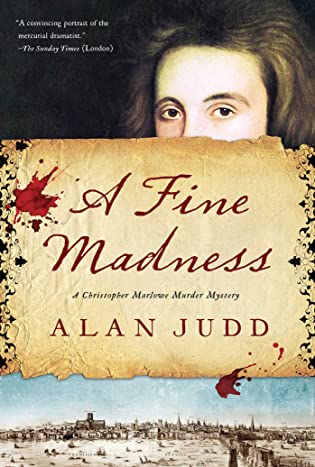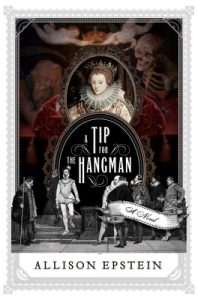 A Fine Madness by Alan Judd
A Fine Madness by Alan Judd Format: eARC
Source: supplied by publisher via Edelweiss
Formats available: hardcover, paperback, ebook, audiobook
Genres: historical fiction
Pages: 256
Published by Pegasus Crime on February 1, 2022
Purchasing Info: Author's Website, Publisher's Website, Amazon, Barnes & Noble, Kobo, Bookshop.org, Better World Books
Goodreads
A captivating espionage novel that explores the life of theatrical genius—and spy—Christopher Marlowe, whose violent death remains one of the most fascinating mysteries of the Elizabethan Age.
In Elizabethan England, the queen’s chief spymaster, Francis Walsingham, and his team of agents must maintain the highest levels of vigilance to ward off Catholic plots and an ever-present threat of invasion from Spain.
One agent in particular—a young Cambridge undergraduate of humble origins, controversial beliefs, and literary genius who goes by the name of Kit Marlowe—is relentless in his pursuit of intelligence for the Crown. When he is killed outside an inn in Deptford, his mysterious death becomes the subject of rumor and suspicion that are never satisfactorily resolved.
Years later, when Thomas Phelippes, a former colleague of Marlowe’s, finds himself imprisoned in the Tower of London, there is one thing that might give him his freedom back. He must give the king every detail he is able to recall about his murdered friend’s life—and death. But why is King James so fascinated about Kit Marlowe—and does Phelippes know enough to secure his own redemption?
My Review:
To paraphrase Ben Kenobi, “this is not the book you are looking for”, at least not if you picked it up based on the blurb above. As I did.
The blurb isn’t even correct in its facts. Christopher Marlowe didn’t die “outside” an inn in Deptford. He died inside the inn. While that may be the end of Marlowe’s story, it’s only the beginning of just how different this book is from its blurb and my expectations.
I picked this up because it sounded like a different perspective on Christopher Marlowe’s meteoric rise, catastrophic fall – especially that fall – and just how he got from being a scholarship student at Cambridge to spying for England’s most famous historical spymaster, Sir Frances Walsingham.
 In other words, I was hoping for something that would be a slightly different take on the marvelous version of Marlowe’s story told in last year’s terrific and utterly absorbing A Tip for the Hangman.
In other words, I was hoping for something that would be a slightly different take on the marvelous version of Marlowe’s story told in last year’s terrific and utterly absorbing A Tip for the Hangman.
Color me extremely disappointed. If you’re looking for an excellent historical novel about Marlowe that deals with his spycraft and the possible reasons for his death, read A Tip for the Hangman by Allison Epstein. You will not be disappointed.
And in spite of Hangman being over 100 pages longer than this book, it’s a shorter and much more captivating read. (I’ve also heard that if you’re looking for a true crime exploration of Marlowe’s death, The Reckoning by Charles Nicholl is worth reading. I can’t confirm or deny as I have not read it – and reading mileage as listed in Goodreads reviews varies considerably.)
For a life that burned as bright as Marlowe’s did, this account of it is remarkably dry, dull, stiff and slow. It’s a slog to get through and it shouldn’t be considering its source material. This is probably related to its framing device, that of one of Marlowe’s former colleagues and sort-of friends, long after Marlowe’s death, is relating what he remembers about the man to a court official inquiring on behalf of the about-to-be-late king James I (of England) and VI (of Scotland).
Thomas Phelippes is a historical figure who did work as a cryptographer for Walsingham, did participate in some of the events that Marlowe did and did spend much of his life after Walsingham’s death in and out of jail for various offenses. Phelippes was much better at managing the kingdom’s business than he was his own.
But we are all the heroes of our own stories, and that’s as true with this fictional version of Phelippes as anyone else. The fictional version seems to have known Marlowe better than is supported in the historical record, but it is still a knowing at more than one remove. Marlowe drops in and out of the man’s life, often shocking him with his outrageous views of pretty much everything, but never revealing much of his own core.
Also the obsequiousness of Phelippes address and speech seriously grates on 21st century eyes and ears. He’s frequently dull, often boring, and always more verbose than required.
The upshot of which is that A Fine Madness is way more about the way that Marlowe made Phelippes question his own faith and beliefs than it is about Marlowe or what he believed – or did.
To make a long story short – but not as long a story as Thomas Phelippes’ story feels like it is, this is not the book you are looking for if you’re looking for a book that is anything like the blurb suggests this is. If you want THAT book, A Tip for the Hangman is a much, much better bet.
Escape Rating D+: Using the perspective of a character who neither went to playhouses nor read poetry to tell the story of someone who had a secret life as a spy but was known and celebrated for his plays and his poetry (and still is!) turns out to be a peculiar and ultimately unsuccessful choice of narrator for a story that should have – and has in other hands – sparkled and stung in equal measure.


















One thought on “Review: A Fine Madness by Alan Judd”
Comments are closed.